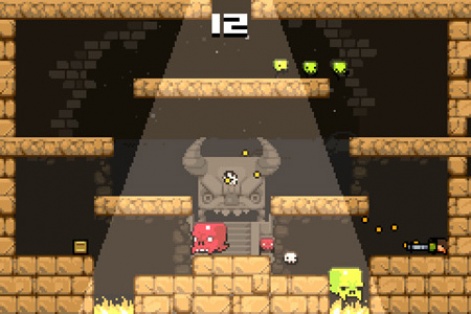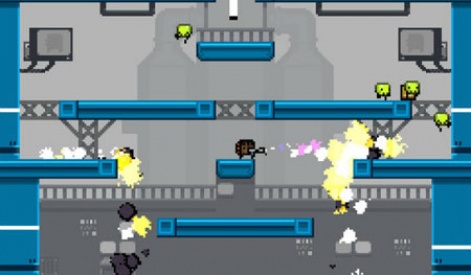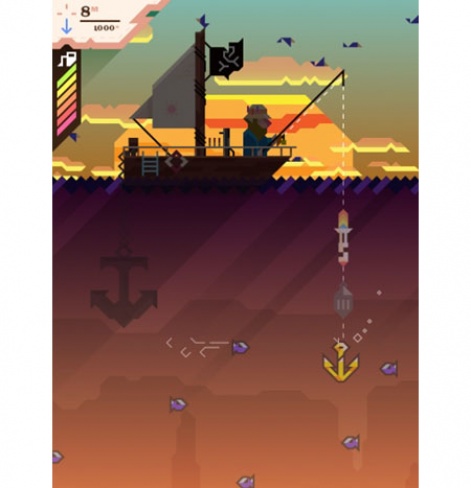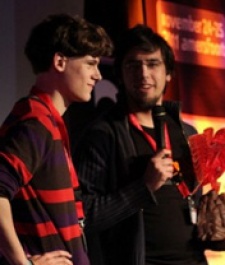Much tooing and froing occurred between Vlambeer and the game's developer Gamenauts but ultimately the clone was released, rushed to the top of the charts, and Vlambeer's progress on that front halted - at least for the time being.
But despite such a deflating experience, Vlambeer refocused its efforts on bringing its other PC game Super Crate Box to iOS.
Working with Canadian studio Halfbot, it was successfully launched in January 2012, with 85 million crates (a measure of gameplay) already collected.
We caught up with business guy and developer Rami Ismail and game designer Jan Willem Nijman to open the lid on Super Crate Box's development.
Pocket Gamer: Where did the concept of Super Crate Box come from?
Super Crate Box is the result of Jan Willem's years of attempts to make a good platform shooter.
The process created a lot of rather horrible games, ranging from atrocious to those - at best - worth 20 seconds of your time. He also made a lot of decent ones, some of them even going as far as to get some attention from players.
But either way, Jan Willem never made that one platform shooter that was just plain great, so, in the end, he changed his approach and cut away all the nonsense. Suddenly, he had come up with the basis of Super Crate Box.

Super Crate Box
Why did you decide to move it from being a freeware PC/Mac game to a paid iOS game?
Super Crate Box was originally meant to be our business card; our way of showing the world 'this is what we do'.
The game did better than we could have dreamt and the amount of requests for mobile versions was overwhelming all other requests and questions. We didn't have the knowledge to make iOS games back then, so we teamed up with Canadian studio Halfbot. We quickly realised we needed a lot of expensive hardware, too. There simply wasn't a way to feasibly make this game without charging for it.
What did you learn from the PC development and how much did player feedback shape the iOS game?
The problem with porting Super Crate Box is that Super Crate Box [PC] is really the best Super Crate Box there is.
So instead of improving on the game, we tried to at least match the PC/Mac version on iOS. The control scheme was the biggest challenge.
How did you make it work on a touchscreen?
We tested a lot. We went as far as testing the game with complete strangers on the train, trying to see if there were any complaints.
We didn't really ask for opinions, instead we focused on what we saw these people do and how they reacted to the way their actions unfolded. We'd then tweak or change the scheme accordingly as soon as we got to a working PC.
How did you decide on the three themes for the levels? Are there more on the way?
Super Crate Box has some backstory to it, and the progression of the levels will give you a clue as to what it is.
Either way, the three levels we have now are the result of dozens of other levels not making the final game. They are the most distinct, most fun and most interesting levels we could make.

More Super Crate Box
We felt adding more levels would only be adding fluff. We don't like pretending to have lots of content while everything feels quite alike.
Your upcoming game Ridiculous Fishing had issues with a copycat on iOS. Have you had any such issues with Super Crate Box?
Super Crate Box inspired another iOS game, which is kind of cool since it was actually a game inspired by our original.
In the case of Ridiculous Fishing, that was a blatant clone and that hurt Vlambeer quite a lot. Not in terms of money, mind you, but in terms of motivation.
Creativity turns out to be quite fragile and it ended up delaying all our releases until we were back to speed again, a few months later. Trying to regain traction cost us a lot of time and energy and we nearly ran out of money trying to re-establish ourselves, but we're back and we fully intend to show Ridiculous Fishing will blow the clone out of the water.
We're a bit scared people will think Ridiculous Fishing is a clone, though.
So far you've promised updates based on how many crates are being collected, but appear to be having trouble keeping up?
Oh man. Haha, that was overwhelming. We couldn't believe how fast the counter [crates opened] went and so instead of taking a few days of rest after working ourselves to death to release the game in time, we ended up working 48 hours straight to release the first update.
The second update we had actually completed in time, but sadly we ran into a serious bug that deleted user save data in rare cases. Since we really, really wouldn't wish it upon anyone to lose an amazing high score, we pulled it and have been fixing that issue since. It seems to be stable, so we've submitted it right now.
Can you give a rough breakdown of the development time and any significant tools you used?
Making the original game cost us three days of prototyping and then six months of development and tweaking. The iOS port took about the same time as that, with the main timesink being the controls.
For the original game, GameMaker version 7 was used for the prototype that ended up being the final game. Photoshop and GraphicsGale were the tools that the artists used.
For the iOS version, the entire thing was recoded from scratch in Xcode with Objective C using a heavily modified version of Adam Saltsman's [of Semi Secret Software] Flixel iOS - the same engine that powers iOS hit games Canfield and ZiGGURAT.
What were the biggest obstacles you had to overcome through the development process?
We were dealing with the demotivation that the cloning case caused us and ended up juggling four projects at once. That nearly burned us out and while from a health perspective it should have kept us from working full-time on things, we kept pushing to get those games done.
We don't think we were really pleasant people to hang with during those weeks, but the fans and support pulled us through.
Also, we always hear negative stuff about the App Store and we agree it might not be perfect, but we really want to give Apple's developers relations team a shout out. They've been absolutely amazing in helping us out with problems, questions and information about the App Store. Without them, Super Crate Box would've never reached as many people.
What's next for Vlambeer on mobile?
Ridiculous Fishing!
We demoed a really early version of the game at the Game Developers Conference 2012, where it was been nominated for the Independent Games Festival awards.

Ridiculous Fishing (PC)
We'll also be at PAX East, so if anyone is around there feel welcome and come drop by the Boston Indie Showcase during PAX East.
Thanks to Vlambeer for its time.
You can follow the company on Twitter, Facebook or via website.






















